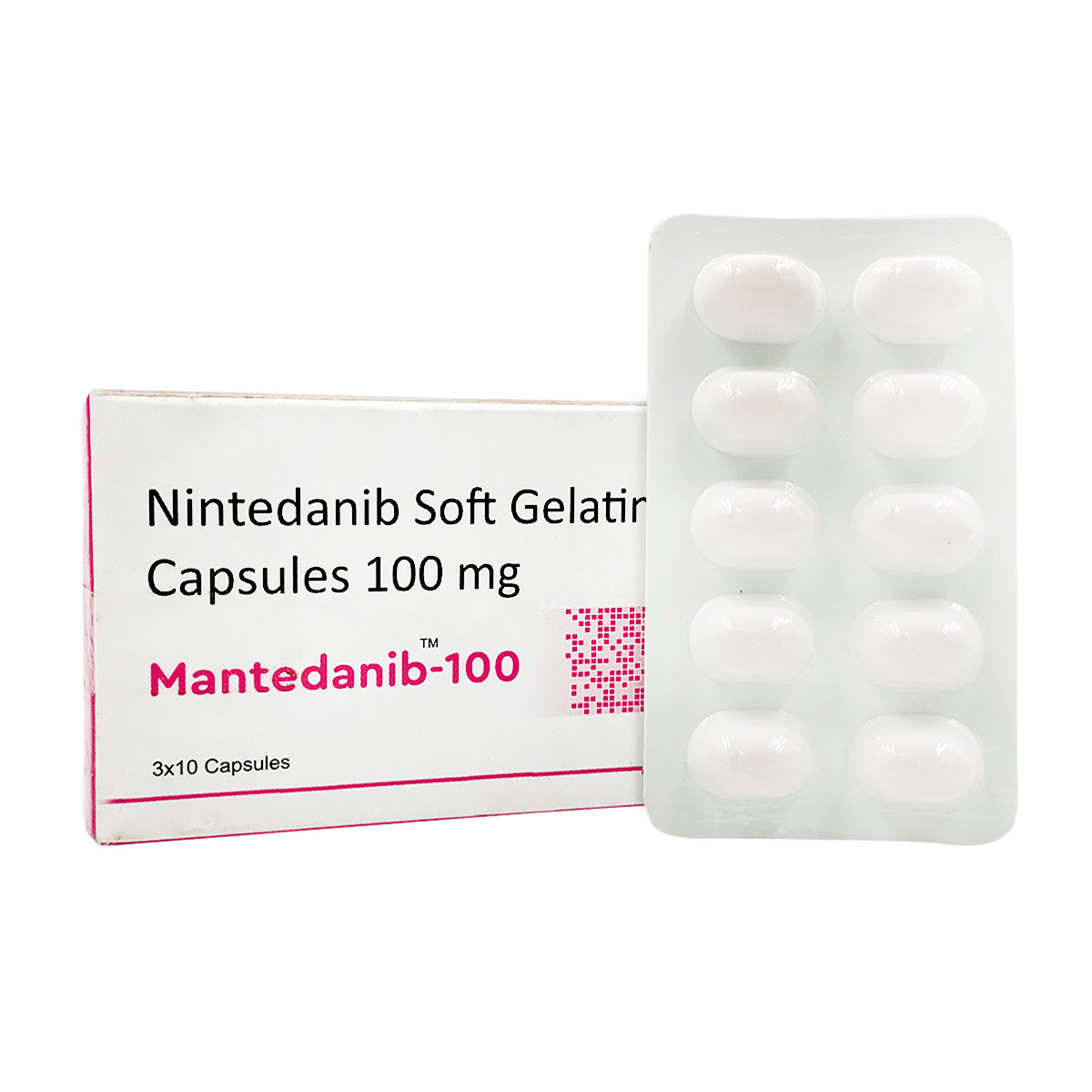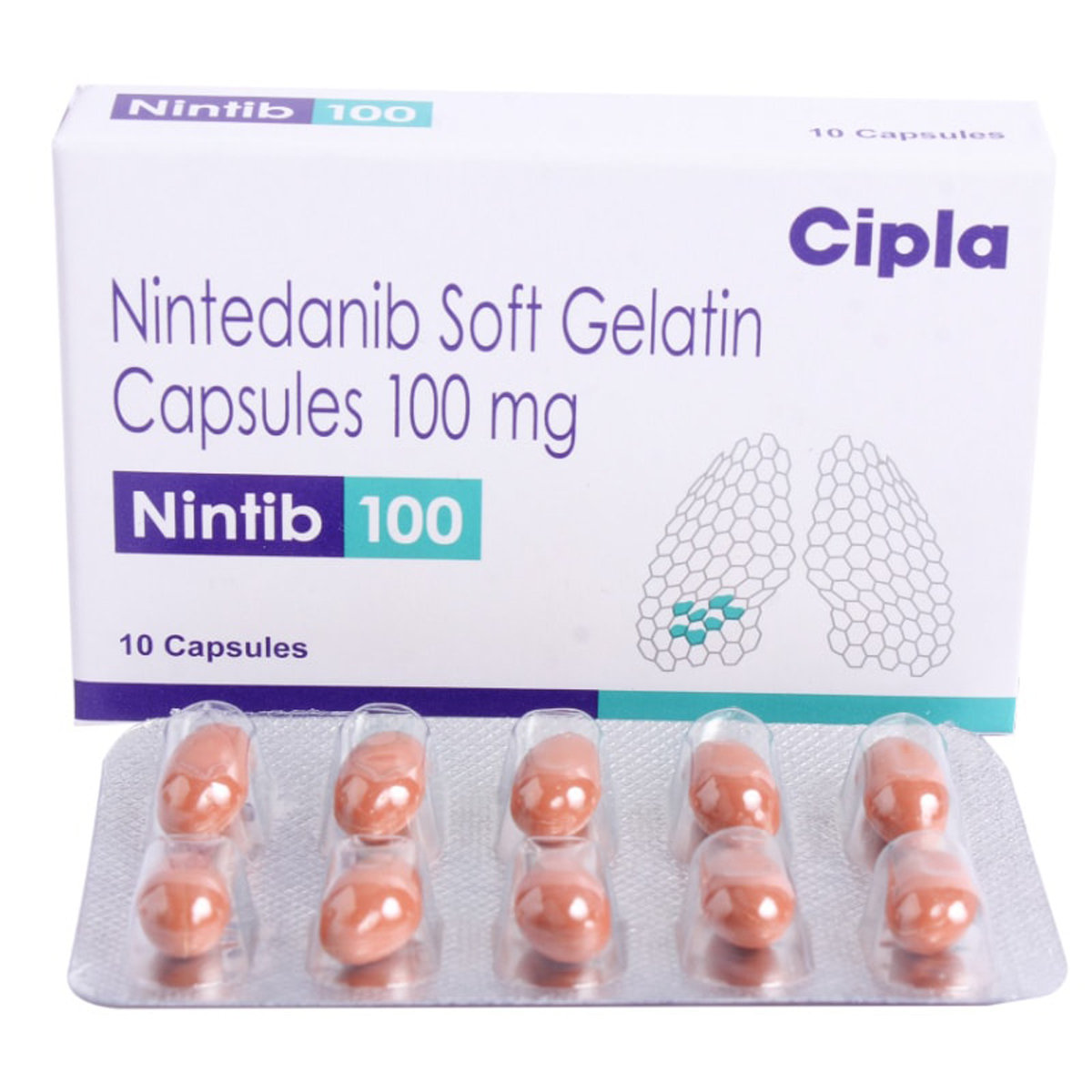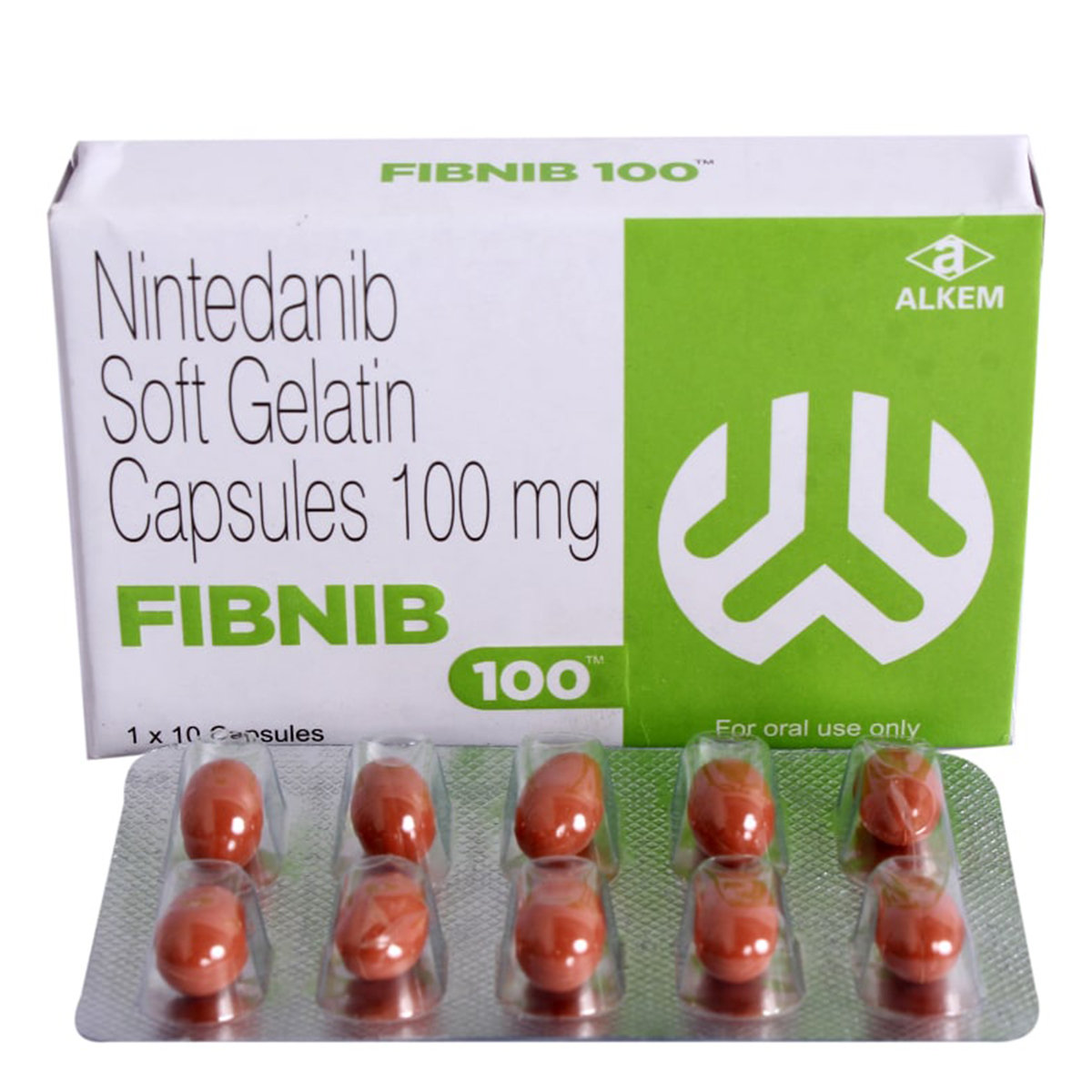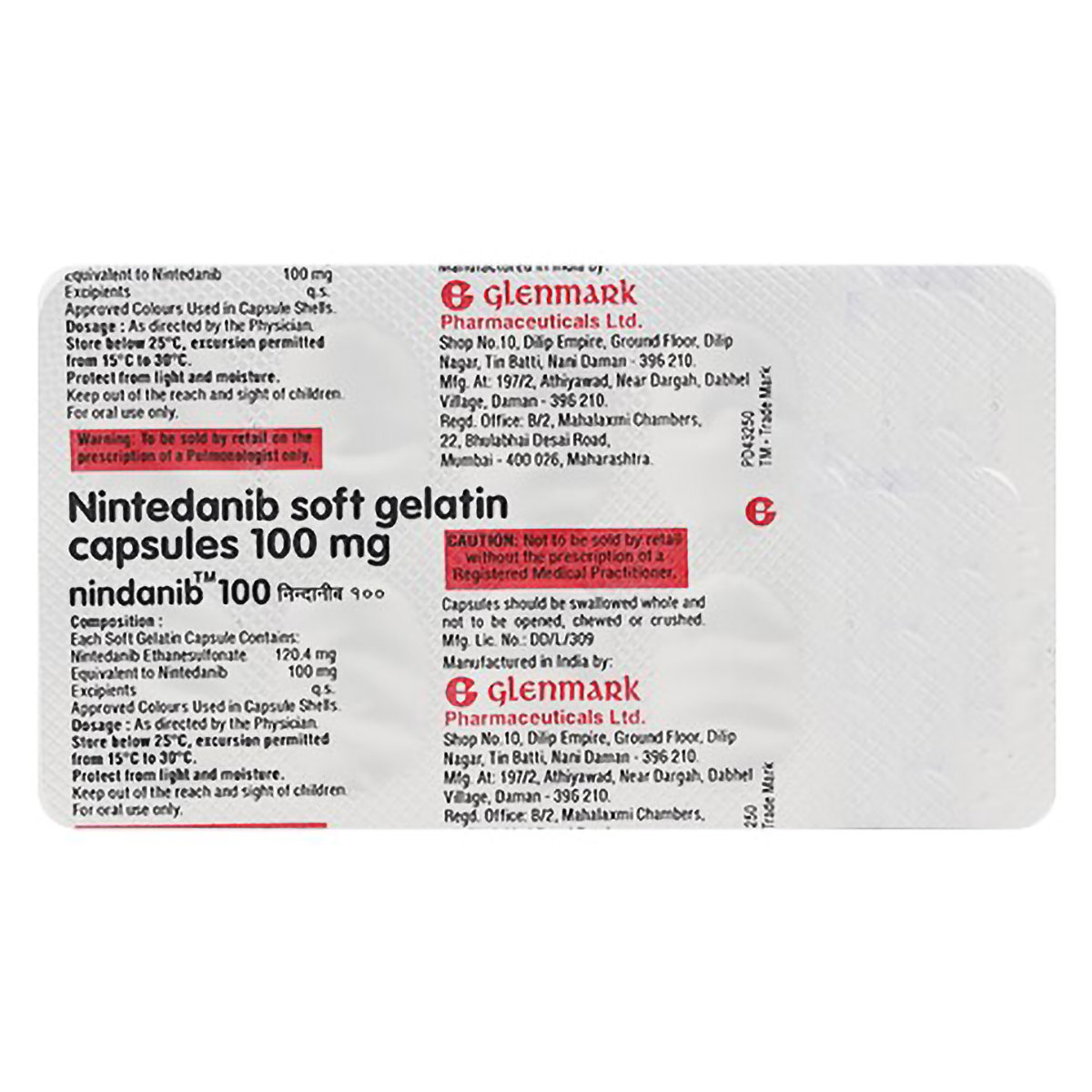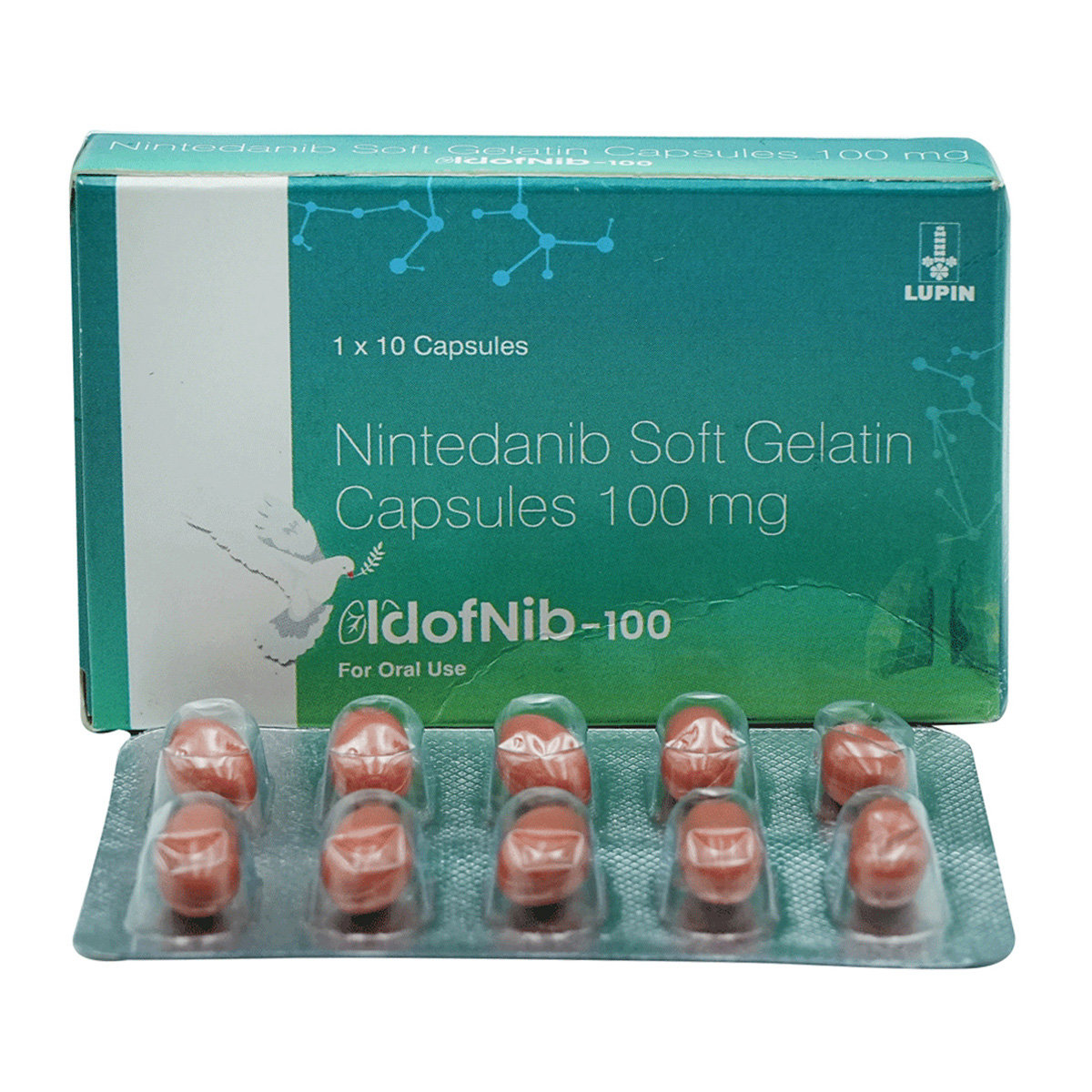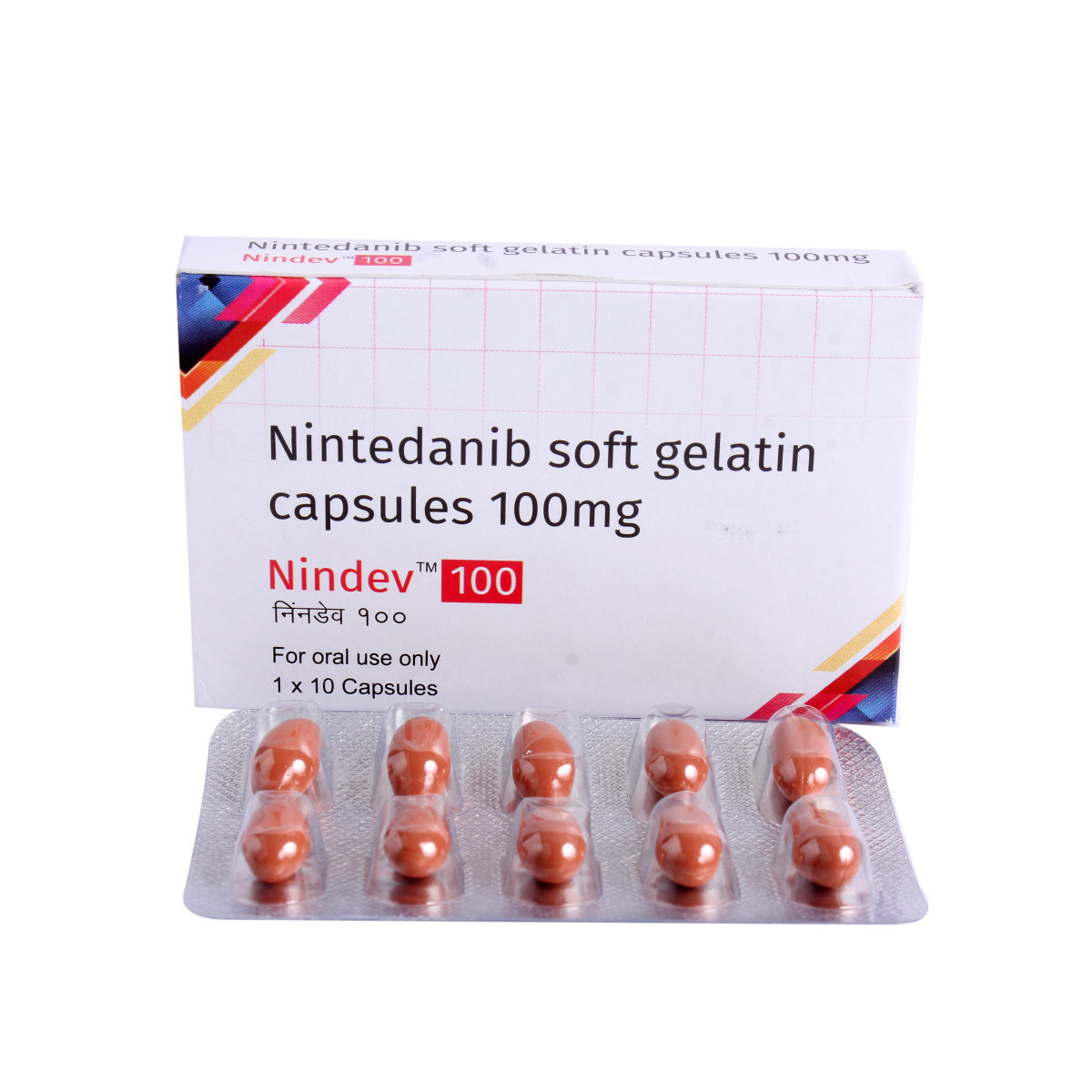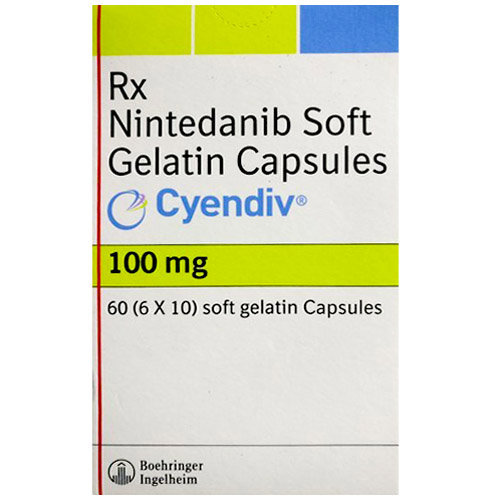Bronchonib 100 mg Capsule 10's
MRP ₹703
(Inclusive of all Taxes)
₹105.5 Cashback (15%)
Provide Delivery Location
Online payment accepted
 Prescription drug
Prescription drugWhats That
Composition :
Manufacturer/Marketer :
Consume Type :
Return Policy :
About Bronchonib 100 mg Capsule 10's
Bronchonib 100 mg Capsule 10's belongs to the category of 'anti-fibrotic medicine', and it is primarily used to treat idiopathic pulmonary fibrosis (IPF) in adults. IPF is an irreversible disease marked by a progressive decline in lung function. The tissues in the lungs become swollen and scarred over time, due to which it gets difficult to breathe deeply. The scarring makes it hard for the lungs to work properly.
Bronchonib 100 mg Capsule 10's contains 'Nintedanib', which helps reduce the scarring and swelling in the lungs by decreasing the release/activity of naturally occurring growth factors in the body, allowing you to breathe better. Bronchonib 100 mg Capsule 10's helps in slowing down the progress of idiopathic pulmonary fibrosis.
Always use this medicine as your doctor has told you or per the package leaflet. You must keep to your doctor's instructions to get the maximum benefit. In some cases, you may experience common side effects such as nausea, tiredness, diarrhoea, indigestion, loss of appetite, headache, and photosensitivity. Most of these side effects do not require medical attention and will resolve gradually over time. However, you are advised to talk to your doctor if you experience these side effects persistently.
Consult your doctor before taking Bronchonib 100 mg Capsule 10's if you are pregnant or breastfeeding. Bronchonib 100 mg Capsule 10's may cause tiredness and dizziness, so drive with caution. Avoid consuming alcohol with Bronchonib 100 mg Capsule 10's as it could lead to increased dizziness. Bronchonib 100 mg Capsule 10's is not recommended for children below 18 years as safety and effectiveness have not been established. Bronchonib 100 mg Capsule 10's is listed as pregnancy category D. Because Bronchonib 100 mg Capsule 10's can cause harm to the fetus, women of childbearing potential should be advised to avoid becoming pregnant while receiving treatment with Bronchonib 100 mg Capsule 10's. Consult your doctor if you are breastfeeding; your doctor will decide whether the Bronchonib 100 mg Capsule 10's can be taken by breastfeeding mothers or not. Keep your doctor informed about your health condition and medicines to rule out any side effects.
Uses of Bronchonib 100 mg Capsule 10's
Directions for Use
Key Benefits
Bronchonib 100 mg Capsule 10's is an anti-fibrotic medicine used to treat idiopathic pulmonary fibrosis (IPF) in adults. Bronchonib 100 mg Capsule 10's can help effectively slow the rate of lung function decline by 50%. Bronchonib 100 mg Capsule 10's helps reduce the scarring and swelling in the lungs by decreasing the release/activity of naturally occurring growth factors in the body, allowing you to breathe better. Bronchonib 100 mg Capsule 10's helps in slowing down the progress of idiopathic pulmonary fibrosis.
Storage
- Do not scratch the affected region to avoid discomfort and infection.
- Avoid spicy and fatty foods and caffeine and alcohol as they can worsen diarrhoea and irritate the skin.
- Frequently wash your hands to avoid infection.
- Clean the skin with fragrance-free, soft wipes to reduce inflammation.
- Let your doctor know if the rash is severe, widespread, or painful.
- Inform your doctor about the nausea and discuss possible alternatives to the medication or adjustments to the dosage.
- Divide your daily food intake into smaller, more frequent meals to reduce nausea.
- Opt for bland, easily digestible foods like crackers, toast, plain rice, bananas, and applesauce.
- Avoid certain foods that can trigger nausea, such as fatty, greasy, spicy, and smelly foods.
- Drink plenty of fluids, such as water, clear broth, or electrolyte-rich beverages like coconut water or sports drinks.
- Use ginger (tea, ale, or candies) to help relieve nausea.
- Get adequate rest and also avoid strenuous activities that can worsen nausea.
- Talk to your doctor about taking anti-nausea medication if your nausea is severe.
- Record when your nausea occurs, what triggers it, and what provides relief to help you identify patterns and manage your symptoms more effectively.
- Preventing Vomiting (Before it Happens)
- Take medication exactly as prescribed by your doctor. This can help minimize side effects, including vomiting.
- Having a small meal before taking your medication can help reduce nausea and vomiting.
- Talk to your doctor about taking anti-nausea medication along with your prescribed medication.
- Managing Vomiting (If it Happens)
- Try taking ginger in the form of tea, ale, or candy to help alleviate nausea and vomiting.
- What to Do if Vomiting Persists
- Consult your doctor if vomiting continues or worsens, consult the doctor for guidance on adjusting your medication or additional treatment.
- To minimize pain and swelling, apply an ice pack or cold compress wrapped in a cloth as soon as there is bleeding or bruises.
- Use a warm compress 48 hours later to promote blood flow and hasten the healing process.
- Rest and limit activity to prevent further injury.
- Elevate the affected area above the level of your heart to reduce blood flow.
- To treat discomfort, your doctor may offer over-the-counter pain medicines.
- Inform your doctor if you develop large bruises without injury or experience frequent bruising, as this may indicate an underlying condition.
- Follow a low-fiber, soft food diet with easily digestible liquids and pureed foods.
- Begin with clear liquids like water, broth, and electrolyte drinks.
- Progress to soft foods like mashed potatoes, applesauce, plain yogurt, scrambled eggs, and well-cooked rice.
- Avoid high-fiber foods, raw vegetables, tough meats, spicy foods, and irritants to the digestive tract.
- Eat smaller, frequent meals to reduce digestive strain.
- Stay hydrated with plenty of fluids, avoiding sugary drinks.
- Chew food thoroughly to aid digestion.
- Avoid strenuous activities and rest when needed.
- Before altering your diet, seek guidance from your healthcare provider.
- Always follow your doctor's instructions on dietary restrictions and medical supervision.
Drug Warnings
Do not use Bronchonib 100 mg Capsule 10's if you are allergic to any components present in Bronchonib 100 mg Capsule 10's. Bronchonib 100 mg Capsule 10's is listed as pregnancy category D; because Bronchonib 100 mg Capsule 10's can cause harm to the fetus, women of childbearing potential should be advised to avoid becoming pregnant while receiving treatment with Bronchonib 100 mg Capsule 10's. Consult your doctor if you are breastfeeding; your doctor will decide whether the Bronchonib 100 mg Capsule 10's can be taken by breastfeeding mothers or not. Keep your doctor informed about your health condition and medicines to rule out any side effects. Bronchonib 100 mg Capsule 10's may cause tiredness and dizziness, so drive with caution. Avoid consuming alcohol with Bronchonib 100 mg Capsule 10's as it could lead to increased dizziness. Bronchonib 100 mg Capsule 10's is not recommended for children below 18 years as safety and effectiveness have not been established.
Drug-Drug Interactions
Drug-Drug Interactions
Login/Sign Up
Coadministration of Bronchonib 100 mg Capsule with Fosphenytoin can reduce the levels of Bronchonib 100 mg Capsule. This can lead to low treatment outcomes.
How to manage the interaction:
Although there is a possible interaction between Bronchonib 100 mg Capsule and Fosphenytoin, you can take these medicines together if prescribed by your doctor. Do not stop using any medications without a doctor's advice.
Co-administration of Leflunomide and Bronchonib 100 mg Capsule can increase the risk of liver problems.
How to manage the interaction:
Co-administration of Leflunomide and Bronchonib 100 mg Capsule can lead to an interaction, they can be taken together if prescribed by a doctor. However, if you experience fever, chills, joint pain or swelling, unusual bleeding or bruising, skin rash, itching, less desire to eat, fatigue, nausea, vomiting, abdominal pain, or yellowing of the skin or eyes, contact a doctor immediately. Do not discontinue any medications without consulting a doctor.
Coadministration of Phenytoin and Bronchonib 100 mg Capsule may decrease the blood levels of Bronchonib 100 mg Capsule, which may reduce Bronchonib 100 mg Capsule's effectiveness.
How to manage the interaction:
Although taking Phenytoin and Bronchonib 100 mg Capsule together can result in an interaction, it can be taken when your doctor has prescribed it. Contact a doctor if your symptoms do not improve. Do not stop taking any drugs without consulting a doctor.
Co-administration of Lomitapide and Bronchonib 100 mg Capsule can increase the risk of liver problems.
How to manage the interaction:
Co-administration of Lomitapide and Bronchonib 100 mg Capsule can lead to an interaction, but it can be taken if your doctor advises. However, if you experience any symptoms like fever, chills, joint pain, unusual bleeding, skin rash, vomiting, abdominal pain, dark-colored urine, light-colored stools, and/or yellowing of the skin or eyes, contact your doctor immediately. Do not discontinue any medications without first consulting your doctor.
Coadministration of Bronchonib 100 mg Capsule and primidone can reduce the blood levels of Bronchonib 100 mg Capsule.
How to manage the interaction:
Although there is an interaction between Bronchonib 100 mg Capsule and primidone, it can be taken if prescribed by a doctor. However, if you experience any unusual symptoms, contact a doctor immediately. Do not discontinue any medications without consulting a doctor.
Coadministration of Bronchonib 100 mg Capsule and Rifapentine can reduce the blood levels of Bronchonib 100 mg Capsule.
How to manage the interaction:
There may be a possibility of interaction between Bronchonib 100 mg Capsule and Rifapentine, but it can be taken if prescribed by a doctor. Contact your doctor if your symptoms do not improve. Do not discontinue any medications without consulting your doctor.
Coadministration of Dexamethasone may lower the blood levels of Bronchonib 100 mg Capsule, making the medication less effective in treating your condition.
How to manage the interaction:
Although there is a possible interaction, Dexamethasone can be taken with Bronchonib 100 mg Capsule if prescribed by the doctor. Contact a doctor if your symptoms do not improve. Do not discontinue any medications without consulting a doctor.
Coadministration of Bronchonib 100 mg Capsule and Tipranavir can reduce the blood levels of Bronchonib 100 mg Capsule.
How to manage the interaction:
There may be a possibility of interaction between Bronchonib 100 mg Capsule and Tipranavir, but it can be taken if prescribed by a doctor. Contact your doctor if your symptoms do not improve. Do not discontinue any medications without first consulting your doctor.
Coadministration of Bronchonib 100 mg Capsule with Rifampicin can decrease the blood levels of Bronchonib 100 mg Capsule, which may make the medication less effective.
How to manage the interaction:
Although there is an interaction between Bronchonib 100 mg Capsule and rifampicin, they can be taken together if prescribed by a doctor. Do not discontinue any medications without consulting a doctor.
Taking Phenobarbital and Bronchonib 100 mg Capsule can drastically lower Bronchonib 100 mg Capsule levels in the blood, making the medicine less effective in treating the illness.
How to manage the interaction:
Although taking phenobarbital with Bronchonib 100 mg Capsule can lead to interaction, they can be taken if recommended by a doctor. Contact a doctor if your symptoms do not improve. Do not stop using any medications without talking to a doctor.
Drug-Food Interactions
Drug-Food Interactions
Login/Sign Up
Diet & Lifestyle Advise
- Watch out for triggers that worsen the cough, such as smoke, foods, air-conditioning, high altitude, etc.
- Exercise moderately. Eat healthily.
- Follow pulmonary rehabilitation program. It includes exercise, disease education, and group therapy.
- Quit smoking and alcohol.
- Get ample rest.
- Include green leafy vegetables, sweet potatoes, broccoli, tomatoes, carrots, mangoes, citrus fruits, berries, and cocoa.
- Lean proteins such as fish, meat, and poultry are the best.
- Hydration is important. Drink plenty of water, herbal tea, and vegetable and fruit juices.
- Avoid processed and refined foods.
Side Effects of Bronchonib 100 mg Capsule 10's
- Diarrhoea
- Feeling and being sick
- Tummy (Abdominal) Pain
- Loss of appetite and weight loss
Habit Forming
Therapeutic Class
All Substitutes & Brand Comparisons
RX
Nintib 100 Capsule 30's
Cipla Ltd
₹78
(₹2.34 per unit)
96% CHEAPERRX
Prutis 100 Softgel Capsule 10's
Hetero Drugs Ltd
₹609
(₹54.81 per unit)
22% CHEAPERRX
Out of StockMacdanib 100 Softgel Capsule 10'S
Macleods Pharmaceuticals Ltd
₹690
(₹62.1 per unit)
11% CHEAPER
Author Details
We provide you with authentic, trustworthy and relevant information
Drug-Diseases Interactions
Drug-Diseases Interactions
Login/Sign Up
FAQs
Drug-Drug Interactions Checker List
- KETOCONAZOLE
- ERYTHROMYCIN
- CYCLOSPORINE
- RIFAMPICIN
- CARBAMAZEPINE
- PHENYTOIN
Special Advise
- Regular blood tests and occasional tests of your bone marrow will be carried out to check whether the treatment is working. If it does work, it will usually be taken for life.
Disease/Condition Glossary
Idiopathic pulmonary fibrosis (IPF): Idiopathic pulmonary fibrosis belongs to a group of interstitial lung diseases. It is an irreversible chronic disease marked by a progressive decline in lung function. The tissues in the lungs become inflamed and scarred over time, due to which it gets difficult to breathe properly. The scar tissue, known as fibrosis, becomes thick /stiff over time, making it hard for the lungs to work efficiently. This causes decreased lung function, which leads to increased breathlessness and coughing. Breathing difficulties can lead to other medical problems. Symptoms of IPF are shortness of breath, persistent dry cough, loss of appetite, weight loss, and rounded and widened tips of the fingers and toes.

Have a query?
Alcohol
Safe if prescribed
It is not known if alcohol interacts with Bronchonib 100 mg Capsule 10's. However, as a precautionary measure, you are recommended not to consume alcohol with the Bronchonib 100 mg Capsule 10's to avoid unpleasant side effects.
Pregnancy
Consult your doctor
Bronchonib 100 mg Capsule 10's is listed as pregnancy category D. Because Bronchonib 100 mg Capsule 10's can cause harm to the fetus, women of childbearing potential should be advised to avoid becoming pregnant while receiving treatment with Bronchonib 100 mg Capsule 10's.
Breast Feeding
Consult your doctor
Consult your doctor if you are breastfeeding; your doctor will decide whether Bronchonib 100 mg Capsule 10's can be taken by breastfeeding mothers or not.
Driving
Safe if prescribed
Bronchonib 100 mg Capsule 10's may significantly influence your ability to drive and use machines. You should not drive or operate machinery if you feel sick.
Liver
Consult your doctor
Dose adjustment may be needed. Bronchonib 100 mg Capsule 10's is not recommended for patients with severe hepatic impairment. Please consult your doctor if you have a liver impairment or any concerns.
Kidney
Consult your doctor
Dose adjustment may be needed. Bronchonib 100 mg Capsule 10's is not recommended for patients with an end-stage renal disease requiring dialysis. Please consult your doctor if you have kidney impairment or any concerns.
Children
Safe if prescribed
Bronchonib 100 mg Capsule 10's is not recommended for children below 18 years as safety and effectiveness have not been established.





